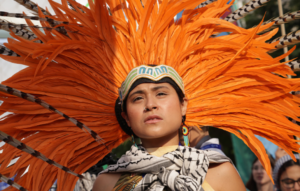Respect for Democracy — and Women — Is Required to Solve Climate Change
Originalluy published by Zikora Ibeh for Women’s Media Center
Often, the global climate discourse centers on the logistics of cutting emissions and mitigating the effects of climate change, as well as mobilizing resources to guarantee the security of vulnerable communities. However, an equally crucial but less discussed aspect is the role of democratic freedoms — free speech, assembly, and access to information — in shaping climate justice and solutions.
Although seldom acknowledged, there is a clear connection that exists between the climate crisis and eroding democratic freedoms across parts of the world. Particularly noteworthy is how the repression of these freedoms not only impedes overall climate action but also disproportionately limits the participation of women in environmental dialogues.
The United Nations reports that at least three environmental human rights defenders (EHRDs) are killed around the world weekly, with many more subjected to harassment, criminalization, and forced displacement. Because of their unique roles and intimate connections to contested natural resources in areas of corporate and extractive interests, Women and indigenous peoples are most vulnerable to these attacks.
Their responsibilities to families and communities, including native convictions to safeguard nature’s resources such as water, forests and biodiversity, frequently place them in direct conflict with entrenched corporate and political interests.
Further underlining this grim reality are findings from a June 2023 study conducted by the Autonomous University of Barcelona and the University of Helsinki, in which researchers examined over 500 documented cases of violence against women EHRDs. In 81 instances, the women had been assassinated by state actors, organized criminal groups, business interests, or a combination thereof.
Tragically, this victimization of women EHRDs is not only confined to resource-rich and contested areas but is also prevalent in the global climate discourse and action spaces. These forums, which ought to serve as safe havens for populations most affected by climate change instead replicate the same patterns of exclusion and silencing.
At the recently concluded 2023 United Nations Climate Change Conference, otherwise known as COP28, climate advocates not only frowned at the choice to host the conference in Dubai, a petrostate and one of the most restrictive environments for human rights defenders, they also noted the limiting guidelines for climate protests within the meeting venue. These limits were upheld by the United Nations Framework on Convention on Climate Change (UNFCCC), the secretariat that oversees the conference.
The UNFCCC guidelines prohibited climate activists not only from participating in demonstrations, but also from naming and shaming big polluters, and waving country flags.
In some cases, activists reported coming under surveillance for the range of their expression. This is what happened to Sarah Ekwale, an activist from Nigeria, who shared her experience with the Women’s Media Center.
‘‘Soon after I finished speaking at a demonstration against false climate solutions, colleagues warned that I might be under surveillance,” Ekwale said. “I called out names of communities and countries impacted by climate change and environmental degradation in Africa, as well as the oil corporations responsible for the destruction.”
She continued: “Apparently, while I was speaking, security officials approached the organizers of the demonstration asking for my name and stating that I had allegedly violated some rules.’’
The suppression of fundamental freedoms in dealing with the problem of climate change has far-reaching implications for climate action. Restrictions on the flow of information and organizing leads to a lack of awareness and understanding of climate issues in society. This progression naturally breeds a significant decrease in grassroots movements and public pressure on governments and corporations to adopt sustainable practices for a greener future.
And for women in communities that contain extractives, this situation is particularly distressing, said Hellen Neima, a climate activist from Uganda and co-organizer of the Make Big Polluter Pay campaign at the nonprofit group Corporate Accountability, which is based in Boston.
‘‘Historically, women have been underrepresented in environmental decision-making processes and their voices have been marginalized in public discourse due,” she said. “This gender disparity is exacerbated when freedoms are curtailed. Women, who are often at the forefront of community-level environmental management and are disproportionately affected by climate change, find their opportunities to contribute to the climate conversation severely limited.’’
Women EHRDs and green advocates face both the general risks associated with activism as well as gender-specific challenges, including gender-based violence and societal stigma against women as leaders. This double jeopardy — being restricted both as a citizen and as a woman — significantly undermines the potential of women to influence climate policy and action.
To address these challenges, concerted efforts are required. To start, people must be able to express themselves, and state authorities must allow them freely organize and participate in the kinds of decision-making processes that affect their environment and livelihoods. Governments, international organizations, and civil society must also collaborate to dismantle the barriers that hinder women’s active participation in climate discourse and in broader society. This includes holding corporations accountable, promoting gender-sensitive policies and enforcing consequences for actions that threaten the lives and participation of women in the climate governance.
‘‘Overall, there is a pressing need to deepen efforts in propagating the gospel of gender equality in society and the global climate regime,” said Ekwale.
